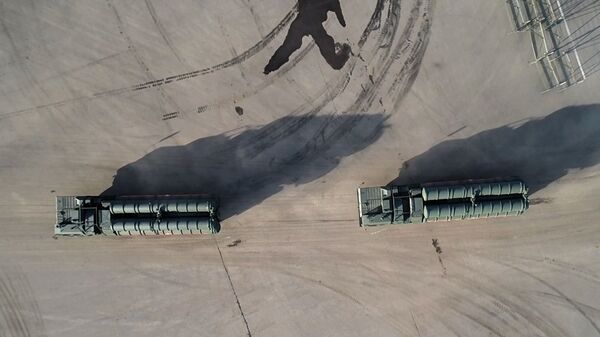The Turkish military has begun new field testing of its Russia-bought S-400 air defence systems against US-made F-16 and F-4 fighter jets at the Murted Air Base outside Ankara, aviation blog Fighter Jets World has reported, citing open source intelligence.
According to the portal, the testing began on July 4, and is set to continue until November 26.
Turkey is said to have proceeded with the testing in spite of warnings from Washington that the activation of the S-400s could result in new sanctions against Ankara.
The Turkish government has remained tightlipped about the testing, with a statement from the Turkish government reportedly confirming only that F-16s and other Turkish Air Force jets would be carrying out low and high altitude test flights in the vicinity of Ankara “within the scope of some projects carried out in coordination with the presidency of defence industries.”
However, an unauthenticated image shows what the outlet claims is a US-made jet flying over Murted while S-400 components, including the 91N6E and 96L6E radars, operate on the ground.
The Turkish military is known to have begun testing of its S-400s against US-made fighters as far back as November 2019, with TRT World releasing footage of air defence system’s radars operating while fighters flew overhead. The extent of the testing was not immediately clear, as Turkey only planned to make its S-400s fully operational by April of this year, although it was reported that the testing was related to establishing cross compatibility between the platforms to avoid accidental friendly fire incidents.
Turkey’s purchase of the Russian-made air defence systems led to a downturn of relations between Ankara and Washington, with the US unceremoniously booting the country out of the F-35 fighter program, despite Turkey’s status as a senior partner, and threatening sanctions under the Countering America’s Adversaries Through Sanctions Act (CAATSA), a legal act threatening punishment against any country which purchases Russian-made weapons.
Earlier this week, a bipartisan group of US senators asked Defence Secretary Mark Esper to speed up the pace at which Turkey is removed from the F-35’s supply chain, and reiterated their support for the imposition of sanctions against Ankara using CAATSA.
Before that, senior Republican Senator John Thune suggested that the US try to buy out Turkey’s S-400s as a way to allow Turkish President Erdogan to get “out of the jam he put himself in” by buying the systems. Late last month, Omer Celik, press secretary of Turkey's ruling Justice and Development Party, said there were no legal grounds for Turkey to sell its S-400s from Russia to the US, adding that Ankara would be the systems' "final user."
The S-400 remains the most advanced road-mobile anti-aircraft weapons system in Russia's arsenal, and is capable of shooting down everything from enemy aircraft and drones to ballistic and cruise missiles at ranges of up to 400 km. In addition to Russia and Turkey, the system is operated by China and Belarus. Russia and India signed a $5.5 billion deal for the delivery of 4 regiments of S-400s in October 2018, with New Delhi recently asking that the shipment be expedited.



